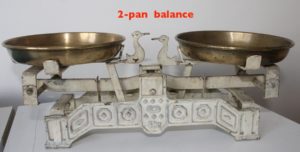Most people think that politics can’t be fixed. When I ask them if it can be fixed, most say, “That’s impossible!” But they can’t prove it. They’re guessing. Most people think that if the answer isn’t obvious, there’s no answer. Most people think that even if the answer is not obvious, if you tell them the answer, they’ll understand it. Often they’re right. But sometimes, such as with fixing politics, they’re mistaken.
Many years ago, I was in college with a dear friend, Frank Shih. I think he and I were seniors in college at the time, in the applied math program.
He had heard about “The 12-ball problem.” There are two parts.
Part 1- Twelve balls, one is heavier. How few weighings to find it?
Imagine you are given 12 4-ounce steel balls. All seem exactly the same. But a very wise person tells you: “One of them is a tiny bit heavier.” She gives you a pen and the 2-pan balance:
Then she asks: In how few weighings can you guarantee me that you can find out which ball is heavier?
So you put one ball in the left pan and one in the right. They weigh the same. Then, one by one, 10 times, you take the ball out of the right side and put another ball in. In the worst case, the last ball is heavier- it took 11 weighings. She asks, “Can you do it in fewer weighings?”
Sure. It really only takes 10 weighings. I didn’t have to weigh the last ball. You told me one was heavier and the first 10 weighings showed it wasn’t the first 11 balls. So it really only took 10 weighings. She asks again, “Can you do it in fewer weighings?”
You think. You put a ball into each side. Then you take BOTH balls out and put 2 others in. By the time you’ve done that 6 times, you’ve found the heavier ball- 6 weighings. She asks again…
You think again. This time you can put six balls in one side and six in another. One side will go down, so you’ve narrowed it down to one of those 6 balls. Put three of those on one side and three in the other. One side goes down. So now you’ve narrowed it down to 3 balls. Weigh one against the second. Either one is heavier, or it’s the third ball.
Part 2 – Twelve balls, one is different, maybe heavier and maybe lighter…
Then she takes the 12 balls away and tells you, “Here are 12 more balls. One of them is different- either heavier or lighter. In how few weighings can you guarantee finding the different one and knowing if it’s heavier or lighter?”
Frank and I worked on the problem for about an hour. We could do it in four weighings, but couldn’t figure out how to do it in three. He thought three was impossible.
But I wasn’t ready to give up. I said, “Let’s then prove that we CAN’T do in three.” After about half an hour of failing to prove it, I saw why. The reason I couldn’t prove it was the same reason it could be done in three weighings. I saw how!
We can prove very few things are impossible
There are SO MANY ways to act and communicate, so many ways to make rules and organizations. It’s simple-minded to say that fixing politics is impossible. Yes, given our current cultural understanding, it SEEMS impossible. But that’s just the way it seems.
However, as long as you believe it’s impossible, if it takes hard work to see how to do it, you won’t be willing to work hard enough to see it. Once you see it, it might be very easy to keep seeing it. But you won’t be able to get there.
Today, it’s still very easy for me to find one different ball with 3 weighings.
Plus, I can see a very easy way to fix politics. Lend me a million dollars and I’ll prove it. Or, go donate $27 to PeopleCount, add your name to our email list, and get 34 people to do the same and commit to getting 34 people to do the same and commit to getting 34 people to do the same…
PS: Let’s say I gave you a 2-pan balance and 25 balls, one of which is heavier. In how few weighings can you find it (and fix politics)?

